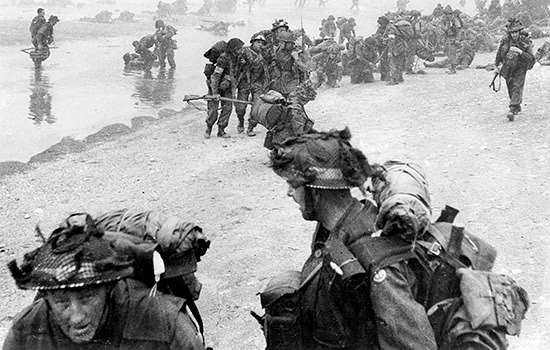The Military at Audley End
When Henry Neville, 7th Lord Braybrooke, died in March 1941 Audley End was requisitioned by the Ministry of Works and turned over to military use.
Initially the house was occupied by local British Army units, but in October of that year the Special Operations Executive (SOE) – Britain’s secret organisation for conducting espionage and sabotage – began using the site as a packing station for canisters used to drop supplies to its agents. The Poles arrived from Briggens, Hertfordshire, in around April 1942 to set up their main training base, known as Station 43, at Audley End.
At any one time, there were around 60 to 80 trainees at Audley End. In all 2,613 Polish Army soldiers volunteered for special operations training during the war, but only 606 completed the rigorous training course, 527 of them at Audley End.
Soldiers trained at Station 43 were mostly officers. The expectation was that when parachuted into Poland they would take up leadership roles within the Polish Home Army (Armia Krajowa), leading detachments of men in underground warfare against the occupying Nazis. Usually, SOE agents were directed from London to carry out reconnaissance and sabotage missions, but once dropped into Poland the Cichociemni took orders from the Home Army command.
While the Cichociemni were at Audley End there was always a British as well as a Polish commanding officer. A contingent of British soldiers was responsible for administrative duties and guarding the house and grounds. The British soldiers slept in the nursery suite, or over the service wing. They used the large day nursery as an orderly room, and the shadows of maps which once hung on the walls were still visible until the room was redecorated in 2014.
From House to Training Base
Before the Poles arrived at Audley End, all the pictures and furniture had been stored away in the state rooms, chapel and picture gallery on the first floor and the fine interiors covered with boards to protect them.
On the ground floor, the Bucket Hall was an orderly room; the great hall was used as a lecture room and dining hall for officers; the Museum Room, butler’s pantry and butler’s bedroom were all mess rooms. Guns and munitions were stored in the cellars and Muniment room. The British commanding officer took over the Red Bedroom Suite on the ground floor.
Bedrooms in the north wing of the first floor were used by the Polish officers. SOE lectures, language training and other courses were held on the second floor. One room was used for making documents that the Cichociemni would need in Poland. Authentic Polish clothes were tailored in the North Turret Room, which had the best light conditions during the winter months. Most of the Polish instructors and trainees also slept on the second floor.
Training the Poles
Station 43 was used by the SOE as a base for operational training, holding and dispatch – it became in effect a finishing school for special forces soldiers. Polish volunteers arrived having already passed paramilitary and fitness courses in Scotland and completed parachute training at Ringway in Cheshire. At Audley End they were trained in underground warfare and briefing or dispatch.
The underground warfare course included sabotage, field craft, reconnaissance and specialist training such as micro-photography and wireless operation. The briefing course was the final stage of training before soldiers were sent out into the field. They were briefed on the current situation in Poland, invented aliases and false identities and were given clothes and false documents. The briefing course lasted 4–6 weeks.
The instructors were nearly all Polish and they devised the courses themselves with support from SOE central command. Among them were Captain Alfons Maćkowiak (Alan Mack) codename Alma, responsible for fitness and shooting, and Captain Antoni Pospieszalski (Tony Currie) codename Luk, who covered radio communication and German language training.
To keep the trainees fit Alan Mack set up an assault course in the wooded area north-west of the house, including a challenging rope crossing over the river Cam. There was also training in close combat, and a target range in the woods.
Activities such as wireless operation and field craft, more likely to attract attention, took place in East Park, well away from the main road.
Captain Alfons Maćkowiak
Captain Alfons Maćkowiak (later known as Alan Mack) was an instructor at Audley End, in charge of fitness, shooting and unarmed combat. He was an experienced soldier, having served as an artillery officer in the Polish Army during the early years of the war. He was taken prisoner by the Russians and then the Germans, but escaped on both occasions through his skill, quick wits and sheer good luck.
Maćkowiak eventually made his way to England from the unoccupied part of France and joined the Polish Army in exile. In 1942 he volunteered for the Cichociemni but was given a training role because of his combat experience.
When interviewed in 2011 he said
I taught [the men] silent killing: shooting with different revolvers, rifles and machine guns. The soldiers had to practise firing at moving targets in the dark. I set up six or seven mechanical targets in the grounds, which I controlled electronically. Physically and psychologically, the men had to be very strong. We were not afraid. We were just killers – every man wanted to kill Hitler.
When Station 43 closed in 1944 Maćkowiak rejoined the 1st Independent Parachute Brigade and took part in the Battle of Arnhem, where he was wounded and again taken prisoner. After the war he settled in Britain, running a guesthouse in Essex before becoming a PE teacher at Bishop Stortford College.
For 25 years he also worked as a coach at the Oxford University Athletics Club. He died in 2017 aged 100 and was given a military funeral in Warsaw and posthumously promoted to the rank of Brigadier General by the Polish President, Andrzej Duda.
Wartime Social life
Though the training was tough, time was set aside for recreation to keep up morale. The housekeeper’s room became a recreation room with comfortable chairs, and the dining parlour was used as a billiard room as it had been in the 19th century. The Poles played during the day and the British soldiers at night to limit mixing.
The men played football, volleyball and tennis on the grassed-over parterre behind the house. Archive photographs also show a sports day on West Park involving sack races, wheelbarrow races and other forms of athletics.
The trainees were not allowed off base, but the Polish instructors mixed socially with their British counterparts off duty in Saffron Walden, visiting the Forces Club in King’s Street, and local pubs and cafes. The officers usually frequented the Rose and Crown Hotel, whilst the other ranks spent time at the Cross Keys.
Local people knew little of what was happening at Audley End, though a few must have suspected something secret was going on from the occasional explosions and small arms fire emanating from the park and night-time manoeuvres of men in camouflage across neighbouring fields.
Uncovering the Past
Today only small fragments of evidence from the days of Station 43 survive in the house. There are a few lines of graffiti in the Coal Gallery candle store, torn labels in the cellar showing where guns and ammunition were stored, and remnants of a timetable on the second floor, just before the nursery. Nails in some of the bedroom walls on the second floor show where the Poles hung up pictures or maps to remind them of home. Elsewhere evidence seems to have been cleared away or painted over post-war.
In the grounds it is still possible to see insulators for telephone wires fixed into the trunks of trees to the left of the Stables Bridge. The bridges in the grounds were used to practise mine-laying, and some ammunition and explosives were discovered when the river Cam was drained in 1976. The family of Alan Mack still have a section of the rope used for the obstacle course over the river Cam.
Though the Cichociemni may have left few physical traces at Audley End, their presence there is recorded for posterity in a wonderful collection of photographs, taken from the archive of the Polish Underground Movement Study Trust. These really bring the war years at Audley End to life, and bear testimony to the rigorous training that took place there.
Remembering the Fallen
Training of Polish special forces soldiers was transferred to liberated southern Italy in December 1944, bringing the life of Station 43 to an end. The house was handed back to the 9th Lord Braybrooke a year later. In 1948 Audley End was bought for the nation for £30,000 through the National Land Fund and opened to the public as a visitor attraction.
In the summer of 1983, a memorial urn was placed in West Park in memory of the 112 Polish parachutists who lost their lives during the war and its aftermath. Present at the unveiling were the Polish Prime Minister in Exile, Kazimierz Sabbat, and then British Defence Minister, Michael Heseltine.
Every year on 11 November (Armistice Day and Polish Independence Day), the staff at Audley End stop their work, and gather at the memorial for a short service, ensuring that the dedication and bravery of the Cichociemni are not forgotten.
Eightieth Anniversary
Audley End remains a place of pilgrimage for many Poles due to its important role in the resistance to Nazi occupation and the forging of the modern Polish state. In recent years the site has welcomed visits from Polish school children, Scout groups and the descendants of many of those who worked or trained here during the war.
February 2021 marked 80 years since the first mission of the Cichociemni into occupied Poland.
The 80th anniversary of the first mission of the Silent Unseen – Cichociemni is an important date in the history of Poland, Polish special operations forces and Polish–British relations. On the night of 15–16 February 1941, the first group of those Polish Army parachutists, who were all volunteers, were dropped into occupied Poland, the first such airdrop behind German lines, offering a glimmer of hope to the besieged homeland that help was coming.
With skills they developed in such places as Audley End, home to the Polish section of the Special Operations Executive, Cichociemni landed under cover of darkness to support the fight against the enemy, becoming the pride of the Polish Republic. Their brave and heroic service inspired GROM, one of Poland's premier special missions units, to adopt their name and continue their traditions. Let their name and sacrifice never be forgotten. Thank you to all who keep the memory of Cichociemni alive.
Arkady Rzegocki, Republic of Poland Ambassador to the United Kingdom
Top image: A trainee tackles the rope crossing over the river Cam.
© Polish Underground Movement (1939–1945) Study Trust, London
Find out More
-

History of Audley End
Read a full account of Audley End’s long and varied history, from the priory founded on the site in the 12th century to the present day.
-

The Polish Special Forces Soldiers of Audley End
In this episode of our Speaking with Shadows podcast, Josie Long visits Audley End to discover the story of the Poles who trained here during the Second World War.
-

Blue Plaque: Christine Granville
Christine Granville, born Krystyna Skarbek, was one of the most remarkable secret agents of the Second World War.
-

D-Day Deception
In 1944, Dover Castle’s tunnels played a supporting role in an elaborate deception that concealed the true location of the D-Day landings from the Germans.
